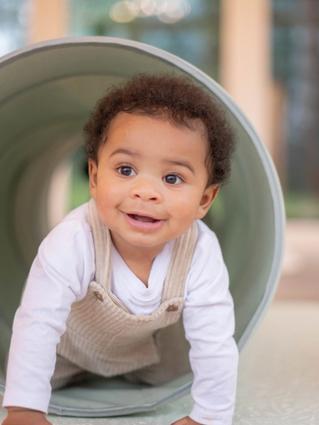
- Home
- Tools And Resources
- Baby Development Calendar
- 9 Months Old Baby | Crawling, Milestones & Tips
9 months old
1 min
Babies of this age…
- May be able to pick up small objects with a thumb-and-finger ‘pincer’ action
- Can eat finger foods on their own
- Have good control when sitting and can turn their heads round and reach for toys without toppling over
- May be able to get into a sitting position from lying down
- Will look for a dropped object (or a thrown one... again and again!)
- May be crawling by now (although some babies ‘bottom shuffle,’ and some never crawl at all)
- Will start to pull themselves up to a standing position by holding on to hands or furniture
- May start to be wary of strangers
Your baby
- Will love to learn from toys that can be shaken, moved about and put into other containers.
- May cry when you go out of sight; playing games of peek-a-boo and hide and seek can help them to learn you don’t actually disappear when they can’t see you.
- Eating finger foods and using a spoon will help improve manual skills and hand-eye co-ordination.
Here comes trouble!
Once babies start to crawl, they’re into everything and need constant supervision. This is when safety in the home becomes most important. Having a safe environment to place your baby in for a few minutes – whether it's a playpen, a cot or a baby activity centre – can be a lifesaver when you have something urgent to take care of.
Now’s also the time many parents start saying ‘no’ a lot. Distraction is usually a better tactic than constantly saying no, however, and you’ll soon become skilled at offering your baby a lovely toy to gnaw on instead of your mobile phone!
Keeping a record
Your baby is growing and changing so fast these days that it's a challenge to keep up! It’s a good idea to periodically jot down the events of a typical day in your baby’s life - what they do, what they say, what they eat. You think you’ll never forget, but you will!
